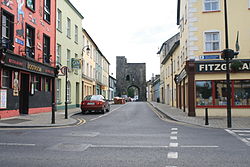Kilmallock
|
Kilmallock Cill Mocheallóg
|
|
|---|---|
| Town | |

Blossom Gate on Emmet Street, Kilmallock
|
|
| Location in Ireland | |
| Coordinates: 52°23′56″N 8°34′30″W / 52.399°N 8.575°WCoordinates: 52°23′56″N 8°34′30″W / 52.399°N 8.575°W | |
| Country | Ireland |
| Province | Munster |
| County | County Limerick |
| Population (2011) | |
| • Urban | 1,635 |
| • Rural | 738 |
| Irish Grid Reference | R607277 |
Kilmallock or Kilmalloc (Irish: Cill Mocheallóg) is a town in south County Limerick, Ireland, near the border with County Cork. There is a Dominican Priory in the town and King's Castle (or King John's Castle). The remains of medieval walls which encircled the settlement are still visible. The Dublin–Cork railway line passes by the town, but the station is now closed. The nearest train station is in Charleville, a few miles south west of Kilmallock.
Saint Mocheallóg built a church in the area in 6th or 7th century, and the town's name derives from the Irish Cill Mocheallóg meaning "the church of Mocheallóg".
The town was of considerable importance in the late medieval period, ranking as one of the main urban areas in Ireland at the time. Kilmallock was located in a position of some strategic importance, and in consequence the town frequently became a target during times of war. In 1571, the town was burned by the rebel Earl of Desmond during the Desmond Rebellions. Seventy years later, during the Irish Confederate Wars, the Dominican Priory of Kilmallock was attacked and destroyed by a Parliamentary Army under Lord Inchiquin in 1648. Its ruins are the best known historic landmark of Kilmallock. The local cemetery is the burial place of the noted eighteenth-century poet Andrias Mac Craith. Better known as An Mangaire Súgach, his best known poem is "Slán le Máigh", a song in praise of the entire Maigue valley when he was temporarily exiled from it. The house where he died still stands at the bottom of Wolfe Tone Street near the River Loobagh. The house known as Tigh An Fhile has information panels about the poet at the doorway. The town also has a small museum depicting the historic past of this once great Geraldine fortress town. It is located on the way to the Dominican Priory.
...
Wikipedia

